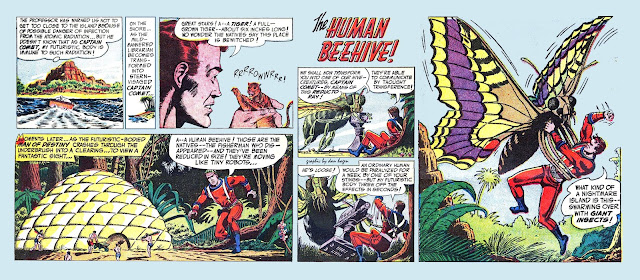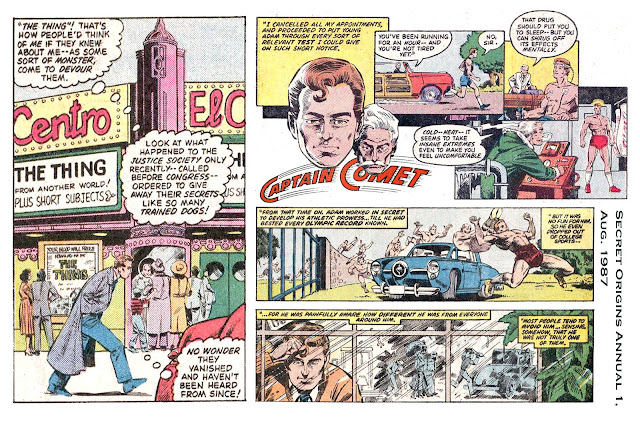June 1953: Empire of the Bees
Two H.G. Wells stories helped
inspire Strange Adventures 33 (June
1953).
In The Human Beehive, Adam Blake travels to an irradiated South
Pacific island to find tiny mammals and gigantic insects, including a
super-intelligent colony of bees that has apparently enslaved the tiny human
islanders.
“Captain Comet is always going on
journeys to other places: often planets, here an island,” observed comics
historian Michael E. Grost. “(Writer
John) Broome often liked his heroes to travel. We also learn here that Captain
Comet is resistant to all forms of radiation, just like Broome's Atomic Knights
to come. This story is crammed with small details and little plot ideas of all
kinds. Although the Captain Comet tales are short, usually six pages, Broome
tried to get as much story into them as possible.”
The discovery of a monstrous
minnow near a nuclear test site sends Captain Comet to the South Pacific. In
fact, the U.S. had detonated its first hydrogen bomb at Eniwetok in the
Marshall Islands just six months before.
The superhero finds a tiger
smaller than a house cat, and a gigantic butterfly that’s attacking scientist
Eric Jason. Once rescued, Jason tells the Man of Destiny that his experiments
have gotten out of hand.
Jason has anticipated Henry Pym
(Ant-Man) and Ray Palmer (the Atom) in successfully changing the size of living
beings. He’s also following in the footsteps of Dr. Moreau, who retired to a
Pacific Island to create intelligent animals in Wells’ 1896 novel.
“It’s been a living nightmare for
me!” Jason says. “They’re out to kill me — in order to use my great discovery
for their own ends, Captain Comet!”
The superhero finds tiny enslaved
island natives serving a giant beehive, and is stung by giant bee that gloats
at him via telepathy.
“We shall now transform you into
one of our hive creatures, Captain Comet — by means of this reducto-ray!”
But the superhero has some
gloating of his own to do. “An ordinary human would be paralyzed for a week by
one of your stings — but my futuristic body threw off the effects in seconds!”
Scattering the super-bees, Captain
Comet confronts Dr. Jason, who was secretly controlling them — something the
superhero deduced because the bee knew his name.
Jason attempts to shrink Captain
Comet, but is thwarted by the superhero’s immunity to radiation. In his
excitement, the scientist plunges off a cliff, carrying his reducto-ray to destruction
with him.
Luckily for the islanders, the
effects of the shrinking ray prove only temporary. “Thank you, Tuan! Thank you!”
exclaim the natives, calling Captain Comet by the Malay word for “sir.”
Alien super-bees would enslave the
JLA a decade later in Drones of the Queen
Bee! (Justice League of America 23,
Nov. 1963).
In Wells’ 1905 short story Empire of the Ants in The Strand Magazine, large and highly
evolved black ants use tools to wage war against humanity in a remote Amazon
River town.





Comments
Post a Comment